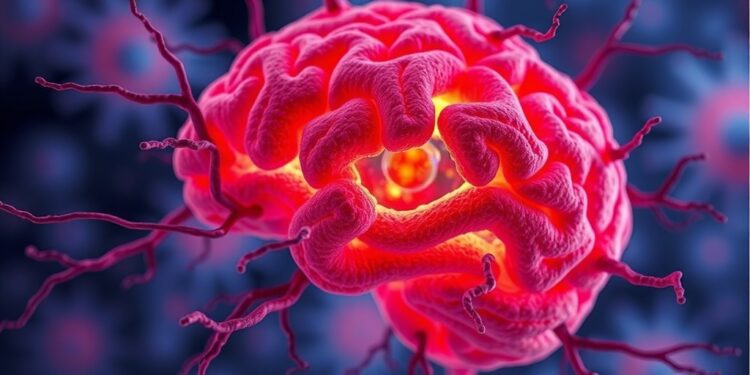
The intricate dance between zinc deficiency and Golgi stress has emerged as a defining factor in cellular aging. Recent research sheds light on this complex interplay, revealing how disruptions in Golgi structure and zinc homeostasis contribute to the physiological decline associated with aging. These findings underscore the critical role of maintaining zinc levels and suggest potential therapeutic avenues for mitigating age-related cellular dysfunctions.
The Golgi apparatus, a vital cellular organelle, orchestrates protein and lipid trafficking while regulating various cellular processes, including mitosis, DNA repair, and stress responses. However, aging disrupts the Golgi’s structural integrity, impairing its functionality. Senescent cells exhibit fragmented Golgi structures, compromised glycosylation, and impaired vesicle transport. These abnormalities not only hinder intracellular communication but also promote protein mislocalization, adversely affecting cellular signaling and epigenetic regulation.
A crucial factor exacerbating Golgi stress is zinc deficiency, a hallmark of aging. Zinc is an essential cofactor for over 300 enzymes and structural support for thousands of transcription factors. Within the Golgi, zinc acts as a molecular glue, stabilizing the Golgin45-GRASP55 complex, which is critical for maintaining Golgi stacking. Zinc deficiency weakens this interaction, triggering Golgi fragmentation. The reduction in zinc levels also hampers the functionality of zinc-binding proteins, further destabilizing Golgi integrity.
The study employed various methods to unravel the mechanisms underlying this interplay. Senescent human fibroblasts exhibited increased expressions of Golgi proteins such as TGN46 and GM130 but displayed reduced zinc-dependent interactions, as evidenced by decreased Golgin45-GRASP55 binding. These findings were corroborated by experiments involving zinc chelation, which mimicked senescence-induced Golgi fragmentation. Interestingly, zinc supplementation alone was insufficient to restore Golgi integrity, highlighting the complexity of zinc homeostasis within the Golgi.
Golgi stress disrupts microtubule dynamics, further aggravating cellular dysfunction. The Golgi apparatus, a major non-centrosomal hub for microtubule nucleation, plays a pivotal role in maintaining cellular architecture and vesicle trafficking. Senescent cells and zinc-deficient models demonstrated impaired microtubule repolymerization and reduced tubulin expression at Golgi sites. These disruptions hindered the nuclear translocation of critical proteins such as p53 and SMAD2, impairing cellular signaling pathways and epigenetic control.
Using a combination of pharmacological and genetic approaches, the researchers confirmed the pivotal role of zinc-dependent Golgi proteins in maintaining cellular homeostasis. The ablation of the Golgi zinc transporter gene Zip13 in mice replicated senescence-like phenotypes, including Golgi fragmentation, reduced microtubule integrity, and impaired protein localization. These findings underscore the significance of Golgi-zinc homeostasis in cellular aging.
Beyond structural and functional disruptions, the study revealed that zinc deficiency amplifies Golgi stress by impairing glycosylation. Proteins such as ZIP14, crucial for maintaining metal homeostasis, exhibited reduced glycosylation under zinc-deficient conditions, further exacerbating cellular dysfunctions. This feedback loop suggests that Golgi stress and zinc deficiency are mutually reinforcing, accelerating the aging process.
Age-related Golgi stress also impacts epigenetic regulation. Proteins involved in chromatin remodeling, such as histone acetyltransferase p300 and deacetylases HDAC1/2, showed altered localization and functionality in senescent cells. These disruptions were linked to reduced nuclear translocation, impairing their ability to regulate gene expression. The study highlighted the interplay between zinc levels, Golgi integrity, and epigenetic control as a critical determinant of cellular aging.
This research not only provides insights into the molecular mechanisms of aging but also opens new avenues for therapeutic interventions. Targeting Golgi stress and zinc deficiency could alleviate age-related cellular decline and improve healthspan. Strategies such as enhancing zinc delivery to specific Golgi-related molecules and stabilizing Golgi structure offer promising directions for future research.
The study’s findings emphasize the importance of maintaining adequate zinc intake throughout life. While zinc supplementation alone may not fully restore cellular function, optimizing zinc homeostasis within the Golgi could mitigate aging-related dysfunctions. These insights underscore the potential of targeting the Golgi apparatus as a novel anti-aging strategy, paving the way for innovative therapeutic approaches to combat age-associated diseases.
Subject of Research: Cellular Aging and Golgi Stress
Article Title : Age-Associated Interplay Between Zinc Deficiency and Golgi Stress Hinders Microtubule-Dependent Cellular Signaling and Epigenetic Control
News Publication Date : January 06, 2025
Article Doi References : https://doi.org/10.1016/j.cell.2025.012345
Keywords : Golgi stress, zinc deficiency, cellular aging, microtubules, epigenetic regulation, zinc transporter, Golgin45, GRASP55, protein mislocalization, aging phenotypes





